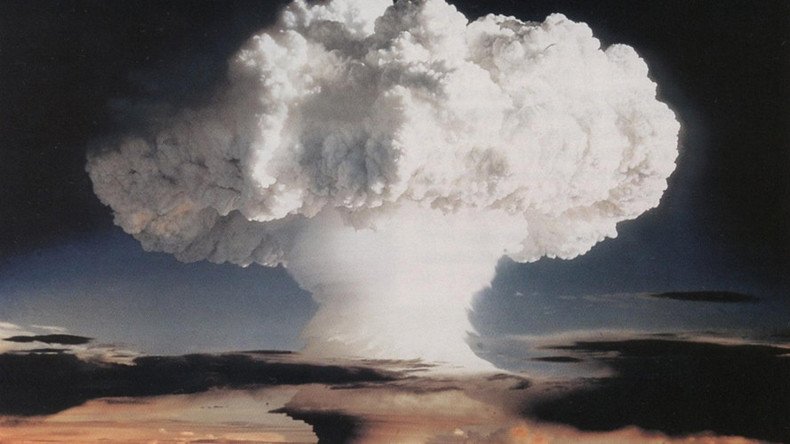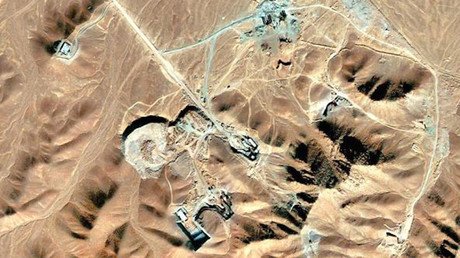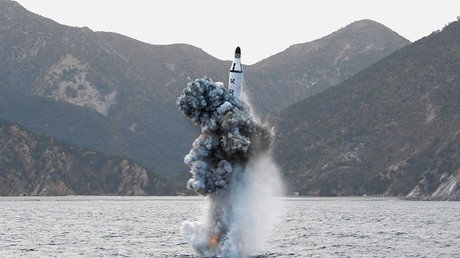Israel will likely be the next country to ratify the nuclear test ban treaty, a UN official says, adding it that shouldn't take more than five years. The treaty is awaiting a greenlight from eight states, including the US, before it can come into effect.
“I'm putting five years as the longest it should take now based on the positive sign that I'm seeing from Israel,” Lassina Zerbo, the executive secretary of the Comprehensive Nuclear-Test-Ban Treaty Organization, (CTBTO), told AP on Wednesday.
The comments follow Zerbo's June visit to Israel, during which he met with Prime Minister Benjamin Netanyahu.
Zerbo went on to credit last year's Iran nuclear deal in the Middle East for “creating the confidence-building conditions in the region to help others to move forward.”
He said he believes it's just a matter of time before Iran – another country which has yet to ratify the CTBT – will also do so.
“I think in Iran it's a matter of when, and the ‘when’ will depend on the condition that will be right...for them to consider the ratification,” he said. “The only thing I say as head of the organization is I hope the ‘when’ is yesterday!”
Zerbo said he has met with Iran's foreign minister, Mohammad Javad Zarif, several times, and that the Iranians actively participate in the CTBTO.
The CTBT so far has 196 member states on board – 183 that have signed it and 164 that have ratified it.
But despite the treaty turning 20 years old this year, it cannot come into force until it is signed by the remaining countries that had nuclear power reactors or research reactors with the UN General Assembly adopted it in 1996 – the US, China, Iran, Israel, Egypt, India, Pakistan and North Korea.
The White House says the Obama administration supports a worldwide ban on nuclear testing, but has not ratified the treaty because it doesn't have enough votes in the Republican-controlled Senate. Moscow has accused Washington of making “no practical steps” to ratify the treaty.
China reaffirmed its support for the treaty during a UN panel to mark International Day Against Nuclear Tests on Wednesday, but did not say when it might ratify it, Zerbo said.
He also said that Pakistan is talking about a “bilateral moratorium with India” on nuclear testing. “They're waiting for a response from India.”
Zerbo went on to express his commitment to reopening dialogue with North Korea, the only country that has tested nuclear weapons in the 21st century.
“What I'm thinking is ‘How can we get them to adhere to a moratorium on nuclear testing as an immediate and first step to denuclearization?’” Zerbo said. “We have to find the means to do that.”
He expressed optimism in doing so, stressing that a pathway to talks with Pyongyang could be something similar to the six-party talks with Iran that led to last year's nuclear deal. He said that six-party talks aimed at renegotiating the denuclearization of the Korean Peninsula – which the North pulled out of in 2008 – could also potentially be used.
Zerbo said that one-on-one talks with countries close to North Korea can lead to wider international discussions because “it's the only way we can get them to stop.”
Meanwhile, Hans Blix – a renowned Swedish diplomat who led the UN’s International Atomic Energy Agency for more than 16 years – told RT in April that the nuclear capabilities held by big powers are more risky than ‘dirty bombs’ in the hands of terror organizations.
“We should remember that there are a little less than 20,000 nuclear warheads still around and they’re not in the hands of terrorists, they’re in the hands of big powers. And the big powers are pretty close to each other. The military has its body language, and we see it over the Baltic and the North Sea, so in this language you have sparks flying which is a very dangerous thing,” Blix said.



